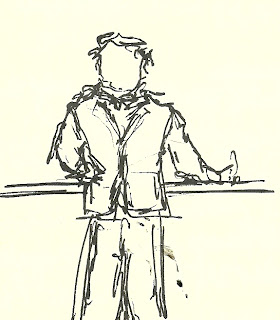'Don Giovanni' review or 'Seduction, singing and a statue in Soho'
'Mozart's Don Giovanni'. A new version by Robin Norton-Hale
Soho Theatre, Monday 22nd August 2011
Written for Culture Wars
 |
| Johnny - Don Giovanni to you and me - surveys the scene |
It is the 'noughties' and naughty banker Johnny is having dinner with some chums at a barrister's posh pad in Sloane Square. The gang murmur quietly and Johnny, relentless seducer that he is, flirts brazenly with the barrister's engaged daughter, Anna. Thumping beats crackle intermittently overhead, mingling with a classical recorded score. Occasionally, the ensemble bursts into full-on operatic blasts, as they pass their wine and smile blankly. A cacophony of sounds struggle for position and, as dinner is cleared away, it is the clattering of cutlery that rings clearest.
This is the muddled opening of Robin Norton-Hale's and OperaUpClose's 'Don Giovanni', the same team behind the wonderfully low-key but sensationally successful 'La Bohème'. There are still many strengths here, notably the restrained wit of Norton Hale's book and the permanent twinkle in the eyes of the (thankfully) cheeky ensemble. But 'La Bohème' was a fairly self-contained story, set amidst the type of squalor that suits the Soho stage nicely. In contrast, 'Don Giovanni' is all about excess, with plumped up humour, bulging characters, a rash murder and some huge, grandstanding numbers. It is a big, big show and, squeezed inside Soho Theatre, it wriggles around uncomfortably.
Whereas the set for 'La Boheme' was suitably closed and dank, 'Don Giovanni' covers far more ground, often glamorous rather than dusted in dirt. Cherry Truluck's haphazard set isn't up to the task; an oddly abstract montage adorns the backwall and a mesh of screens points hazily at various aspects of each apartment, bar or balcony Johnny visits. It feels blurred and strangely empty, particularly when the singing starts and the limited on-stage action grinds to a halt.
 |
| Elvira. Alone. Again. |
In Mozart's original, we get massive crowd scenes, fizzing fights and swirling masquerade balls. We get glitz and glamour and all the things Don Giovanni has chosen to make his heaven on earth, before his doomed descent into hell. But in this production, the ball has become a jaunt to Soho House that we do not see. The luscious ladies have become bar-hopping singletons or silly students, hanging out in bars. It's all a bit mediocre and it makes Johnny, for all of actor Marc Callahan's charms, seem slightly second-rate too.
There are also more stand-alone numbers in this outing for OperaUpClose and they feel, well, alone. I didn't realise how sedentary opera can be, once the big numbers kick off. No doubt, this is why the massive operas engage some massive voices. For a few precious moments, despite whatever splendour the sets might provide, the voice and only the voice must envelop the space. OperaUp Close is a talented ensemble but they are also young and their voices, on the whole (bar an absolutely commanding and terrifying turn from Gerard Delrez as the ghostly barrister), aren't quite ready for the responsibility of a near-empty stage.
 |
| The Barrister. He's back. |
Where the show works best is when it admits its limitations. Robin Norton-Hale's text is amusingly glib, making light-work of an action-heavy plot. With Johnny having already dispatched of one interfering father and acquired countless unsuspecting lovers, he asks his intern Alexander, 'What is the matter?' and receives the dry reply, 'Oh, nothing serious! Two rapes, one murder!' And, as Johnny surveys the mess he has created, he comments with characteristic understatement, 'This is getting awkward.' It is when the show undermines the epic scale of Mozart's piece that it actually feels strongest.
Other undercutting works less well. Frequently, the big numbers are interlaced with a live electronic score from Harry Blake. So, as Blake merges in his R&B and dubstep beats, the cast is left to valiantly fly Mozart's flag above this stream of sound. The two fit awkwardly and it all feels a bit half-baked. The best merging of modern sounds and traditional context comes when Johnny checks his voicemail, to find countless messages from distraught lovers. Strange, twanging technological noises are interspersed with swooning love songs and, for a fleeting moment, a modern-sounding Mozart fills the stage.


Comments
Post a Comment